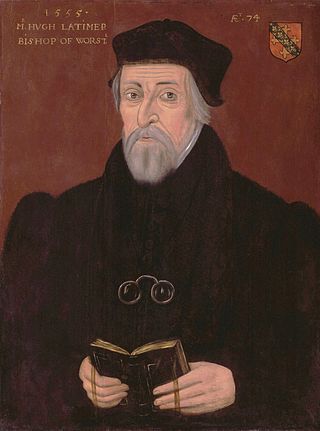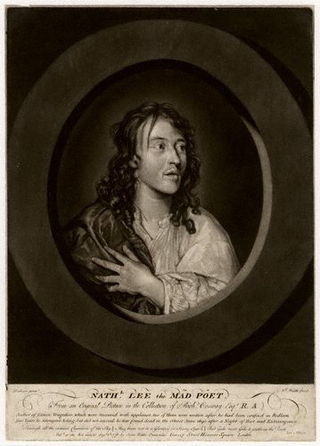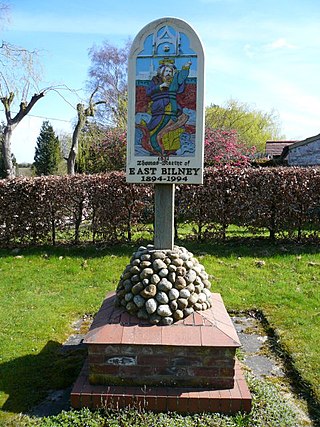Related Research Articles

Sir Thomas More PC, venerated in the Catholic Church as Saint Thomas More, was an English lawyer, judge, social philosopher, author, statesman, and noted Renaissance humanist. He also served Henry VIII as Lord High Chancellor of England from October 1529 to May 1532. He wrote Utopia, published in 1516, which describes the political system of an imaginary island state.
Thomas Kyd was an English playwright, the author of The Spanish Tragedy, and one of the most important figures in the development of Elizabethan drama.

Robert Barnes was an English reformer and martyr.

Hugh Latimer was a Fellow of Clare College, Cambridge, and Bishop of Worcester during the Reformation, and later Church of England chaplain to King Edward VI. In 1555 under the Catholic Queen Mary I he was burned at the stake, becoming one of the three Oxford Martyrs of Anglicanism.

Nathaniel Lee was an English dramatist. He was the son of Dr Richard Lee, a Presbyterian clergyman who was rector of Hatfield and held many preferments under the Commonwealth; Dr Lee was chaplain to George Monck, afterwards Duke of Albemarle, but after the Restoration he conformed to the Church of England, and withdrew his approval for Charles I's execution.

Earl of Leicester is a title that has been created seven times. The first title was granted during the 12th century in the Peerage of England. The current title is in the Peerage of the United Kingdom and was created in 1837.
Jasper Heywood was an English Jesuit priest. He is known as the English translator of three Latin plays of Seneca, the Troas (1559), the Thyestes (1560) and Hercules Furens (1561).

Francisco de Vitoria was a Spanish Roman Catholic philosopher, theologian, and jurist of Renaissance Spain. He is the founder of the tradition in philosophy known as the School of Salamanca, noted especially for his concept of just war and international law. He has in the past been described by scholars as the "father of international law", along with Alberico Gentili and Hugo Grotius, though some contemporary academics have suggested that such a description is anachronistic, since the concept of postmodern international law did not truly develop until much later. American jurist Arthur Nussbaum noted Vitoria's influence on international law as it pertained to the right to trade overseas. Later this was interpreted as "freedom of commerce".

Thomas Bilney was an English Christian martyr.
Nicholas Shaxton was Bishop of Salisbury. For a time, he had been a Reformer, but recanted this position, returning to the Roman faith. Under Henry VIII, he attempted to persuade other Protestant leaders to also recant. Under Mary I, he took part in several heresy trials of those who became Protestant martyrs.

William Bill was Master of St John's College, Cambridge (1547–1551?), Vice-Chancellor of the University of Cambridge (1548) and twice Master of Trinity College, Cambridge, Provost of Eton College (1558–1561) and Dean of Westminster (1560–1561).
George Joye was a 16th-century Bible translator who produced the first printed translation of several books of the Old Testament into English (1530–1534), as well as the first English Primer (1529).
Richard Nykke became bishop of Norwich under Pope Alexander VI in 1515. Norwich at this time was the second-largest conurbation in England, after London.
Thomas Bedyll (died 1537) was a divine and royal servant. He was royal chaplain and clerk of the Privy Council of Henry VIII, assisting him with the separation from Rome.
Edward Crome was an English reformer and courtier.
John Tewkesbury was a Paternoster Row leather merchant in London and Protestant reformer, convicted of heresy and burned at the stake in West Smithfield, London, on 20 December 1531.
William Buckmaster was an English cleric and academic, three times vice-chancellor of the University of Cambridge.
Tomás mac Maghnus Mág Samhradháin was lineage head of the McGoverns and Baron or Lord of Tullyhaw barony, County Cavan from 1512 until his death in 1532.
Elizabeth Freke (1641–1714) was an English memoirist and poet, known for her diaries and remembrances, but also for a collection of recipes covering medicine and cooking. Her poetry includes a dramatic dialogue between Eve and the Serpent of Eden.

East Bilney is a village and former civil parish, now in the parish of Beetley, in the Breckland district, in the county of Norfolk, England. East Bilney is located 7.8 kilometres (4.8 mi) north-west of Dereham and 30 kilometres (19 mi) north-west of Norwich. In 1931, the parish had a population of 117.
References
 This article incorporates text from a publication now in the public domain : "Arthur, Thomas (d.1532)". Dictionary of National Biography . London: Smith, Elder & Co. 1885–1900.
This article incorporates text from a publication now in the public domain : "Arthur, Thomas (d.1532)". Dictionary of National Biography . London: Smith, Elder & Co. 1885–1900.